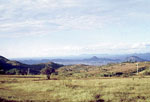
Great Rift Valley
©2002: Africa Focus
|

©2002: Out To Africa
|
|
|
Malawi is the "warm heart of Africa" with abundant wildlife and beautiful scenery in Liwonde national Park. Malawi has a thoroughly deserved reputation for the friendliness of its people. Wherever you go you will receive a welcome which is unsurpassed anywhere else in the world. This is a land of smiles, of genuine friendship. Malawi is a land-locked country with 20% of its territoty covered by Lake Malawi, and it has an incredible variety of stunning landscapes. The unique rolling hills of orchid clad Nyika; the cool forested plateau of Zomba; the 10,000 feet climbers’ paradise of Mulanje Massif; the broad and fertile Shire Valley. From rugged highlands to lowland plains - the scene is ever changing.
Malawi is one of the most densely populated countries of Africa. About one third of the population is Christian, and about 15% Muslim. Malawi, ex Nyasaland, part of the Federation of Rhodesia and Nyasaland,was the first country in the Central African federation to gain independence on the 1st February 1963. In 1891 it had become a British Protectorate, mainly because of its strategic position on the routes between southern Africa and East Africa.
|
Culture:
|
The most notable traditional dance in Malawi is the Gule Wamkulu, indigenous to the Chewa people. The dance reflects traditional religious beliefs in spirits and is connected to the activities of secret societies. Leading dancers are dressed in ragged costumes of cloth and animal skins, usually wearing a mask, and occasionally on stilts. Other groups have their own music and dance traditions. For example among the Timbuka in northern Malawi, the vimbuza is a curative dance performed by traditional healers, or witch doctors, to rid patients of sickness. Local anthropologists report that the demand for vimbuza dancers has increased significantly in recent years, and healers from other northern tribes, such as the Ngoni, have adapted the dance into their own curative ceremonies.
|
|
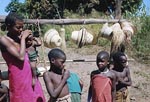
©2002: Africa Focus
|
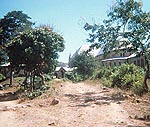
Lokimaisl
©2002: Africa Focus
|
|
Tourism:
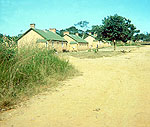
Livingstonia
©2002: Africa Focus
|
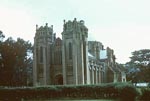
Church of Scottland
©2002: Africa Focus
|
|
|
Malawi’s nine Wildlife Reserves offer true unspoilt wilderness. The only crowds are the animals: lions and leopards; elephants and hippos; antelope and rhino. And the best birdlife in the region. Hundreds of miles of tropical golden sand beaches line Africa’s third largest lake. Lake Malawi is a true inland sea - and tideless. Relax in the sun on an uncrowded beach, hand-feed tropical fish at the world’s first freshwater National Park or enjoy the watersports (expert tuition available). Nkhotakota is reputedly one of the oldest market towns in Africa.
|
Economy:
BLANTYRE, Aug 21 2001 (AFP): The Malawi government has tripled the price of maize, a staple food, amid crushing food shortages in the impoverished southern African country. The price of a 50 kilo (110 pound) sack of maize went up from 3.8 dollars to 13 dollars, the state grain marketing board's spokeswoman Mary Maviko said, adding that the hike was necessary because the grain had to be imported in the wake of poor harvests
resulting from devastating floods. The starchy grain is ground to powder and prepared into a thick porridge called mealy meal. Malawi faces a maize deficit of 180,000 metric tonnes, or 29 percent on last year's production of 2.61 million tonnes due to floods that hit southern parts of the country and washed away crops in March and April. President Bakili Muluzi last month announced that the country would have to import maize from South Africa and the United States to ward off hunger. The government dictates the price of maize, seen here as a sensitive commodity whose pricing has political implications. The International Monetary Fund (IMF), backing tough economic reforms for Malawi, often pressures the government to increase prices of the staple as well as that of fuel to reflect realities on the ground.
Malawi’s economy is based largely on agriculture, which accounts for more than 90 percent of its export earnings, contributes 45 percent of gross domestic product (GDP), and supports 90 percent of the population. Malawi has some of the most fertile land in the region. Almost 70 percent of agricultural produce comes from smallholder farmers. However, land distribution is unequal with more than 40 percent of smallholder households cultivating less than 0.5 hectares. The country’s export trade is dominated by tobacco, tea, cotton, coffee and sugar. Despite the practice of good economic policies from 1995-1997, in more recent years the pace of reforms decelerated, expenditure control was weakened, and agricultural prospects have become more mixed. Tobacco revenues are expected to decline in 2000, due to slumping prices, declining yields and declining quality.
The President:
On 17 May, 1994 eligible Malawians went to the polls to vote in the Parliamentary and Presidential Elections after the constitution had been changed to enable more than one political party to operate in the country. The outcome to those elections was the election of Dr. Bakili Muluzi of the United Democratic Front as the country's President in the first multiparty government in more than 30 years. Dr. Muluzi was sworn-in to the presidency of the Second Republic at a colourful ceremony held at Chichiri Stadium on 21 May, 1994.
History:
Malawi became an independent nation in 1964 after 73 years of British rule. Hastings Kamuzu Banda, named Prime Minister in 1963, was elected President for life in 1971 and instituted authoritarian one-party rule. His control lasted until 1994, when he was defeated by Mr. Bakili Muluzi in the first multiparty elections held in Malawi. Malawi’s economy prospered in the 1970s with the assistance of foreign aid and investment, and grew at an annual rate of 6 percent. In general, though, 30 years of authoritarian rule did not spur significant and broad-based economic development. The new government, which has initiated an economic reform agenda, faces challenges on several fronts, among them a rapidly growing population, a high HIV/AIDS infection rate (about 14.9 percent), limited natural resources, high levels of inequality resulting from years of an elitist development strategy, and the corrosive effects of recurring droughts, poor resource management, and environmental degradation.
Enabling us to improve the quality of the content, if you have additonal information, remarks or suggestions, please share it with us by e-mail.
BLANTYRE, 18 September 2001: Malawi's chief money-spinner, the tobacco industry, said Tuesday it had formed an association to eliminate child labour on tobacco farms.
Amin Mponda-Lungu, vice-president of the Tobacco Association of Malawi (TAMA), told AFP the association had been formed to fight "this evil practice" after Malawi was found to be the worst offender in the region. Mponda-Lungu said the Association for the Elimination of Child Labour (AECL) would respond to an international outcry over the
practice. The minimum working age in Malawi is 14. Employing under-age children is punishable by a fine of nearly 300 US dollars, or five years in jail. However, authorities have not enforced these laws or kept records on the prevalence of child labour in the tobacco industry, the nation's largest employer of around one million people. Poverty, which affects over 65 percent of Malawi's 11 million people, drives children to seek jobs on tobacco estates. Malawi's burley tobacco, called "green gold" here, accounts for up to 70 percent of the country's foreign currency earnings.
"From a visitor "I spent several days at Nkota Bay this summer (2001) and really enjoyed myself. The lake is beautiful and the weather was delightful, but frankly the highlight of my trip was the time I spent in the mountains up north. The people I met there were so warm, friendly and genuine. The isolation and remoteness has allwed people to remain untouched, to a large degree, by the complications of money, media and the
outside influences of other cultures.
(Virginia J. Pulver)
Last update: 24 April 2008
|